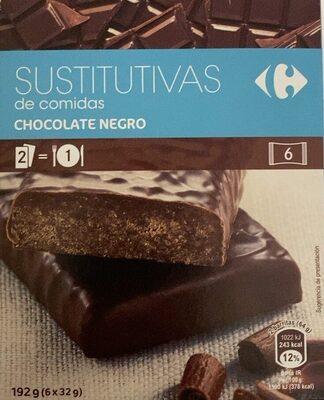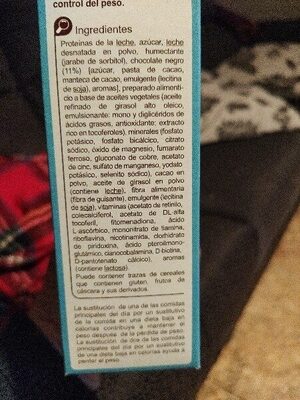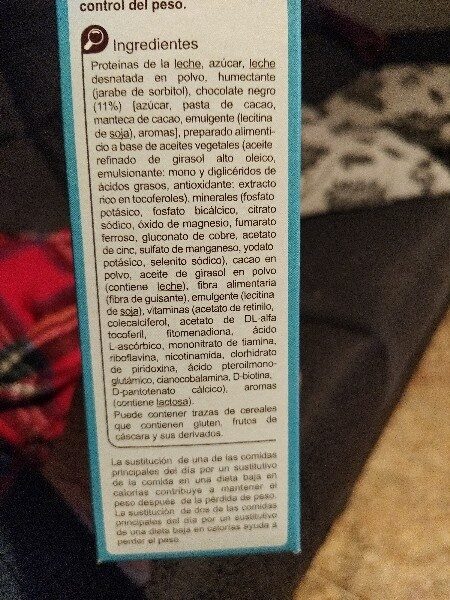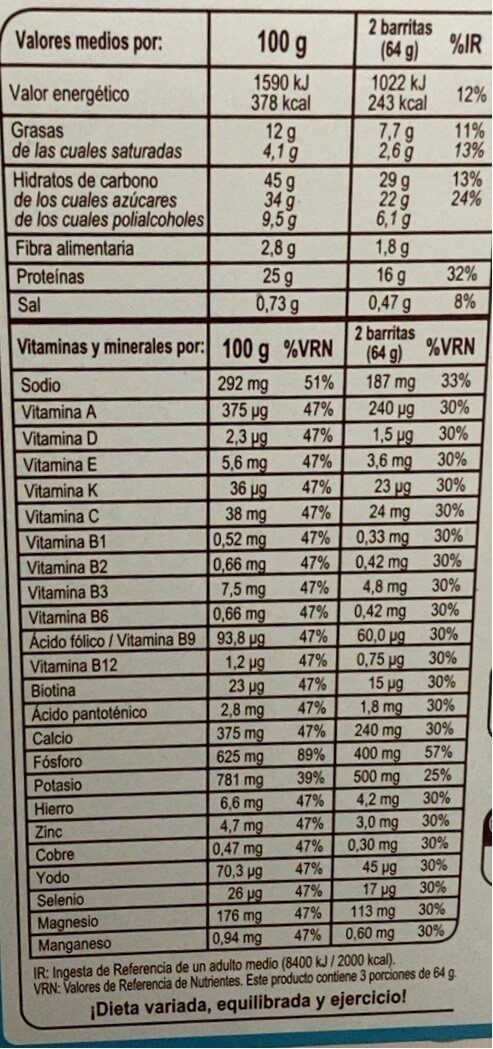Help us make food transparency the norm!
As a non-profit organization, we depend on your donations to continue informing consumers around the world about what they eat.
The food revolution starts with you!
Barrita sustitutiva de chocolate negro - Carrefour - 192 g
Barrita sustitutiva de chocolate negro - Carrefour - 192 g
This product page is not complete. You can help to complete it by editing it and adding more data from the photos we have, or by taking more photos using the app for Android or iPhone/iPad. Thank you!
×
Some of the data for this product has been provided directly by the manufacturer Carrefour España.
Barra-kodea: 8431876292169 (EAN / EAN-13)
Kopurua: 192 g
Markak: Carrefour
Kategoriak: en:Snacks, en:Sweet snacks, en:Bars, en:Cereal bars, en:Chocolate cereal bars
Etiketak, ziurtagiriak, sariak: en:Organic
Dendak: Carrefour
Saltzen diren herrialdeak: Espainia
Matching with your preferences
Health
Osagaiak
-
49 ingredients
Gaztelania: Proteínas de la leche, azúcar, leche desnatada en polvo, humectante (jarabe de sorbitol), chocolate negro (11%) [azúcar, pasta de cacao, manteca de cacao, emulgente (lecitina de soja), aromas], preparado alimenticio a base de aceites vegetales (aceite refinado de girasol alto oleico, emulsionante: mono y diglicetidos de ácidos grasos, antioxidante: extracto rico en tocoferoles), minerales (fosfato potásico bicálcico, citrato sódico, óxido de magnesio, fumarato ferroso, gluconato de cobre, acetato de cinc, sulfato de manganeso, yodato potásico, selenito sódico), cacao en polvo, aceite de girasol en polvo (contiene leche), fibra alimentaria (fibra de guisante), emulgente (lecitina de soja), vitaminas (acetato de retinilo, colecalciferol, acetato de DL-alfa tocoferil, fitromenadiona, ácido L-ascórbico, mononitrato de tiamina, riboflavina, nicotinamida, clorhidrato de piridoxina, ácido pteroilmonoglutámico, cianocobalamina, D-biotina, D-pantotenato cálcico), aromas (contiene lactosa).Alergenoak: en:Milk, en:SoybeansAztarnak: en:Gluten, en:Nuts
Food processing
-
Ultra processed foods
Elements that indicate the product is in the 4 - Ultra prozesatutako elikagaiak eta edariak group:
- Gehigarria: E322
- Gehigarria: E420
- Osagaia: Emulsifier
- Osagaia: Flavouring
- Osagaia: Humectant
- Osagaia: Milk proteins
Food products are classified into 4 groups according to their degree of processing:
- Prozesatu gabeko edo ahalik eta gutxien prozesatutako elikagaiak
- Sukaldaritzako osagaiak prozesatu
- Prozesatutako jakiak
- Ultra processed foods
The determination of the group is based on the category of the product and on the ingredients it contains.
Gehigarriak
-
E322
Lecithin: Lecithin -UK: , US: , from the Greek lekithos, "egg yolk"- is a generic term to designate any group of yellow-brownish fatty substances occurring in animal and plant tissues, which are amphiphilic – they attract both water and fatty substances -and so are both hydrophilic and lipophilic-, and are used for smoothing food textures, dissolving powders -emulsifying-, homogenizing liquid mixtures, and repelling sticking materials.Lecithins are mixtures of glycerophospholipids including phosphatidylcholine, phosphatidylethanolamine, phosphatidylinositol, phosphatidylserine, and phosphatidic acid.Lecithin was first isolated in 1845 by the French chemist and pharmacist Theodore Gobley. In 1850, he named the phosphatidylcholine lécithine. Gobley originally isolated lecithin from egg yolk—λέκιθος lekithos is "egg yolk" in Ancient Greek—and established the complete chemical formula of phosphatidylcholine in 1874; in between, he had demonstrated the presence of lecithin in a variety of biological matters, including venous blood, in human lungs, bile, human brain tissue, fish eggs, fish roe, and chicken and sheep brain. Lecithin can easily be extracted chemically using solvents such as hexane, ethanol, acetone, petroleum ether, benzene, etc., or extraction can be done mechanically. It is usually available from sources such as soybeans, eggs, milk, marine sources, rapeseed, cottonseed, and sunflower. It has low solubility in water, but is an excellent emulsifier. In aqueous solution, its phospholipids can form either liposomes, bilayer sheets, micelles, or lamellar structures, depending on hydration and temperature. This results in a type of surfactant that usually is classified as amphipathic. Lecithin is sold as a food additive and dietary supplement. In cooking, it is sometimes used as an emulsifier and to prevent sticking, for example in nonstick cooking spray.Source: Wikipedia (Ingeles)
-
E322i - Lezitina
Lecithin: Lecithin -UK: , US: , from the Greek lekithos, "egg yolk"- is a generic term to designate any group of yellow-brownish fatty substances occurring in animal and plant tissues, which are amphiphilic – they attract both water and fatty substances -and so are both hydrophilic and lipophilic-, and are used for smoothing food textures, dissolving powders -emulsifying-, homogenizing liquid mixtures, and repelling sticking materials.Lecithins are mixtures of glycerophospholipids including phosphatidylcholine, phosphatidylethanolamine, phosphatidylinositol, phosphatidylserine, and phosphatidic acid.Lecithin was first isolated in 1845 by the French chemist and pharmacist Theodore Gobley. In 1850, he named the phosphatidylcholine lécithine. Gobley originally isolated lecithin from egg yolk—λέκιθος lekithos is "egg yolk" in Ancient Greek—and established the complete chemical formula of phosphatidylcholine in 1874; in between, he had demonstrated the presence of lecithin in a variety of biological matters, including venous blood, in human lungs, bile, human brain tissue, fish eggs, fish roe, and chicken and sheep brain. Lecithin can easily be extracted chemically using solvents such as hexane, ethanol, acetone, petroleum ether, benzene, etc., or extraction can be done mechanically. It is usually available from sources such as soybeans, eggs, milk, marine sources, rapeseed, cottonseed, and sunflower. It has low solubility in water, but is an excellent emulsifier. In aqueous solution, its phospholipids can form either liposomes, bilayer sheets, micelles, or lamellar structures, depending on hydration and temperature. This results in a type of surfactant that usually is classified as amphipathic. Lecithin is sold as a food additive and dietary supplement. In cooking, it is sometimes used as an emulsifier and to prevent sticking, for example in nonstick cooking spray.Source: Wikipedia (Ingeles)
-
E331
Sodium citrate: Sodium citrate may refer to any of the sodium salts of citrate -though most commonly the third-: Monosodium citrate Disodium citrate Trisodium citrateThe three forms of the salt are collectively known by the E number E331. Sodium citrates are used as acidity regulators in food and drinks, and also as emulsifiers for oils. They enable cheeses to melt without becoming greasy.Source: Wikipedia (Ingeles)
-
E331i
Sodium citrate: Sodium citrate may refer to any of the sodium salts of citrate -though most commonly the third-: Monosodium citrate Disodium citrate Trisodium citrateThe three forms of the salt are collectively known by the E number E331. Sodium citrates are used as acidity regulators in food and drinks, and also as emulsifiers for oils. They enable cheeses to melt without becoming greasy.Source: Wikipedia (Ingeles)
-
E340
Potassium phosphate: Potassium phosphate is a generic term for the salts of potassium and phosphate ions including: Monopotassium phosphate -KH2PO4- -Molar mass approx: 136 g/mol- Dipotassium phosphate -K2HPO4- -Molar mass approx: 174 g/mol- Tripotassium phosphate -K3PO4- -Molar mass approx: 212.27 g/mol-As food additives, potassium phosphates have the E number E340.Source: Wikipedia (Ingeles)
-
E420
Sorbitol: Sorbitol --, less commonly known as glucitol --, is a sugar alcohol with a sweet taste which the human body metabolizes slowly. It can be obtained by reduction of glucose, which changes the aldehyde group to a hydroxyl group. Most sorbitol is made from corn syrup, but it is also found in nature, for example in apples, pears, peaches, and prunes. It is converted to fructose by sorbitol-6-phosphate 2-dehydrogenase. Sorbitol is an isomer of mannitol, another sugar alcohol; the two differ only in the orientation of the hydroxyl group on carbon 2. While similar, the two sugar alcohols have very different sources in nature, melting points, and uses.Source: Wikipedia (Ingeles)
-
E420ii
Sorbitol: Sorbitol --, less commonly known as glucitol --, is a sugar alcohol with a sweet taste which the human body metabolizes slowly. It can be obtained by reduction of glucose, which changes the aldehyde group to a hydroxyl group. Most sorbitol is made from corn syrup, but it is also found in nature, for example in apples, pears, peaches, and prunes. It is converted to fructose by sorbitol-6-phosphate 2-dehydrogenase. Sorbitol is an isomer of mannitol, another sugar alcohol; the two differ only in the orientation of the hydroxyl group on carbon 2. While similar, the two sugar alcohols have very different sources in nature, melting points, and uses.Source: Wikipedia (Ingeles)
Ingredients analysis
-
en:Palm oil free
No ingredients containing palm oil detected
Unrecognized ingredients: es:preparado-alimenticio-a-base-de-aceites-vegetales, es:mono-y-diglicetidos-de-acidos-grasos, es:fosfato-potasico-bicalcico, es:selenito-sodico, es:acetato-de-dl-alfa-tocoferil, es:fitromenadionaSome ingredients could not be recognized.
We need your help!
You can help us recognize more ingredients and better analyze the list of ingredients for this product and others:
- Edit this product page to correct spelling mistakes in the ingredients list, and/or to remove ingredients in other languages and sentences that are not related to the ingredients.
- Add new entries, synonyms or translations to our multilingual lists of ingredients, ingredient processing methods, and labels.
If you would like to help, join the #ingredients channel on our Slack discussion space and/or learn about ingredients analysis on our wiki. Thank you!
-
en:Non-vegan
Non-vegan ingredients: en:Milk proteins, en:Skimmed milk powderSome ingredients could not be recognized.
We need your help!
You can help us recognize more ingredients and better analyze the list of ingredients for this product and others:
- Edit this product page to correct spelling mistakes in the ingredients list, and/or to remove ingredients in other languages and sentences that are not related to the ingredients.
- Add new entries, synonyms or translations to our multilingual lists of ingredients, ingredient processing methods, and labels.
If you would like to help, join the #ingredients channel on our Slack discussion space and/or learn about ingredients analysis on our wiki. Thank you!
-
en:Vegetarian status unknown
Unrecognized ingredients: es:preparado-alimenticio-a-base-de-aceites-vegetales, es:mono-y-diglicetidos-de-acidos-grasos, es:fosfato-potasico-bicalcico, en:Iron fumarate, en:Copper gluconate, en:Manganese sulfate, es:selenito-sodico, Zuntz, es:acetato-de-dl-alfa-tocoferil, es:fitromenadiona, en:Thiamin mononitrate, Azido foliko, en:CyanocobalaminSome ingredients could not be recognized.
We need your help!
You can help us recognize more ingredients and better analyze the list of ingredients for this product and others:
- Edit this product page to correct spelling mistakes in the ingredients list, and/or to remove ingredients in other languages and sentences that are not related to the ingredients.
- Add new entries, synonyms or translations to our multilingual lists of ingredients, ingredient processing methods, and labels.
If you would like to help, join the #ingredients channel on our Slack discussion space and/or learn about ingredients analysis on our wiki. Thank you!
-
Details of the analysis of the ingredients
We need your help!
Some ingredients could not be recognized.
We need your help!
You can help us recognize more ingredients and better analyze the list of ingredients for this product and others:
- Edit this product page to correct spelling mistakes in the ingredients list, and/or to remove ingredients in other languages and sentences that are not related to the ingredients.
- Add new entries, synonyms or translations to our multilingual lists of ingredients, ingredient processing methods, and labels.
If you would like to help, join the #ingredients channel on our Slack discussion space and/or learn about ingredients analysis on our wiki. Thank you!
es: Proteínas de la leche, azúcar, leche desnatada en polvo, humectante (jarabe de sorbitol), chocolate negro 11% (azúcar, pasta de cacao, manteca de cacao, emulgente (lecitina de soja), aromas), preparado alimenticio a base de aceites vegetales (aceite refinado de girasol alto oleico, emulsionante (mono- y diglicetidos de ácidos grasos), antioxidante (extracto rico en tocoferoles)), minerales (fosfato potásico bicálcico, citrato sódico, óxido de magnesio, fumarato ferroso, gluconato de cobre, acetato de cinc, sulfato de manganeso, yodato potásico, selenito sódico), cacao en polvo, aceite de girasol, fibra alimentaria (fibra de guisante), emulgente (lecitina de soja), vitaminas, acetato de retinilo, colecalciferol, acetato de DL-alfa tocoferil, fitromenadiona, ácido L-ascórbico, mononitrato de tiamina, riboflavina, nicotinamida, clorhidrato de piridoxina, ácido pteroilmonoglutámico, cianocobalamina, D-biotina, D-pantotenato cálcico, aromas- Proteínas de la leche -> en:milk-proteins - vegan: no - vegetarian: yes - percent_min: 11 - percent_max: 56
- azúcar -> en:sugar - vegan: yes - vegetarian: yes - ciqual_proxy_food_code: 31016 - percent_min: 11 - percent_max: 33.5
- leche desnatada en polvo -> en:skimmed-milk-powder - vegan: no - vegetarian: yes - ciqual_food_code: 19054 - percent_min: 11 - percent_max: 26
- humectante -> en:humectant - percent_min: 11 - percent_max: 22.25
- jarabe de sorbitol -> en:e420ii - vegan: yes - vegetarian: yes - percent_min: 11 - percent_max: 22.25
- chocolate negro -> en:dark-chocolate - vegan: maybe - vegetarian: yes - ciqual_proxy_food_code: 31074 - percent_min: 11 - percent: 11 - percent_max: 11
- azúcar -> en:sugar - vegan: yes - vegetarian: yes - ciqual_proxy_food_code: 31016 - percent_min: 2.2 - percent_max: 11
- pasta de cacao -> en:cocoa-paste - vegan: yes - vegetarian: yes - ciqual_proxy_food_code: 16030 - percent_min: 0 - percent_max: 5.5
- manteca de cacao -> en:cocoa-butter - vegan: yes - vegetarian: yes - ciqual_food_code: 16030 - percent_min: 0 - percent_max: 3.66666666666667
- emulgente -> en:emulsifier - percent_min: 0 - percent_max: 2.75
- lecitina de soja -> en:soya-lecithin - vegan: yes - vegetarian: yes - ciqual_food_code: 42200 - percent_min: 0 - percent_max: 2.75
- aromas -> en:flavouring - vegan: maybe - vegetarian: maybe - percent_min: 0 - percent_max: 2.2
- preparado alimenticio a base de aceites vegetales -> es:preparado-alimenticio-a-base-de-aceites-vegetales - percent_min: 0 - percent_max: 11
- aceite refinado de girasol alto oleico -> en:high-oleic-sunflower-oil - vegan: yes - vegetarian: yes - from_palm_oil: no - ciqual_food_code: 17440 - percent_min: 0 - percent_max: 11
- emulsionante -> en:emulsifier - percent_min: 0 - percent_max: 5.5
- mono- y diglicetidos de ácidos grasos -> es:mono-y-diglicetidos-de-acidos-grasos - percent_min: 0 - percent_max: 5.5
- antioxidante -> en:antioxidant - percent_min: 0 - percent_max: 3.66666666666667
- extracto rico en tocoferoles -> en:e306 - vegan: yes - vegetarian: yes - percent_min: 0 - percent_max: 3.66666666666667
- minerales -> en:minerals - percent_min: 0 - percent_max: 11
- fosfato potásico bicálcico -> es:fosfato-potasico-bicalcico - percent_min: 0 - percent_max: 11
- citrato sódico -> en:e331i - vegan: yes - vegetarian: yes - percent_min: 0 - percent_max: 5.5
- óxido de magnesio -> en:e530 - vegan: yes - vegetarian: yes - percent_min: 0 - percent_max: 3.66666666666667
- fumarato ferroso -> en:iron-fumarate - percent_min: 0 - percent_max: 2.75
- gluconato de cobre -> en:copper-gluconate - percent_min: 0 - percent_max: 2.2
- acetato de cinc -> en:e650 - vegan: yes - vegetarian: yes - percent_min: 0 - percent_max: 1.83333333333333
- sulfato de manganeso -> en:manganese-sulfate - percent_min: 0 - percent_max: 1.57142857142857
- yodato potásico -> en:e917 - vegan: yes - vegetarian: yes - percent_min: 0 - percent_max: 1.375
- selenito sódico -> es:selenito-sodico - percent_min: 0 - percent_max: 1.22222222222222
- cacao en polvo -> en:cocoa-powder - vegan: yes - vegetarian: yes - ciqual_food_code: 18100 - percent_min: 0 - percent_max: 9.33333333333333
- aceite de girasol -> en:sunflower-oil - vegan: yes - vegetarian: yes - from_palm_oil: no - ciqual_food_code: 17440 - percent_min: 0 - percent_max: 8
- fibra alimentaria -> en:fiber - percent_min: 0 - percent_max: 7
- fibra de guisante -> en:pea-fiber - vegan: yes - vegetarian: yes - percent_min: 0 - percent_max: 7
- emulgente -> en:emulsifier - percent_min: 0 - percent_max: 6.22222222222222
- lecitina de soja -> en:soya-lecithin - vegan: yes - vegetarian: yes - ciqual_food_code: 42200 - percent_min: 0 - percent_max: 6.22222222222222
- vitaminas -> en:vitamins - vegan: yes - vegetarian: yes - percent_min: 0 - percent_max: 5.6
- acetato de retinilo -> en:retinyl-acetate - vegan: yes - vegetarian: yes - percent_min: 0 - percent_max: 5.09090909090909
- colecalciferol -> en:cholecalciferol - vegan: maybe - vegetarian: maybe - percent_min: 0 - percent_max: 4.66666666666667
- acetato de DL-alfa tocoferil -> es:acetato-de-dl-alfa-tocoferil - percent_min: 0 - percent_max: 4.30769230769231
- fitromenadiona -> es:fitromenadiona - percent_min: 0 - percent_max: 4
- ácido L-ascórbico -> en:e300 - vegan: yes - vegetarian: yes - percent_min: 0 - percent_max: 3.73333333333333
- mononitrato de tiamina -> en:thiamin-mononitrate - percent_min: 0 - percent_max: 3.5
- riboflavina -> en:e101 - vegan: maybe - vegetarian: yes - percent_min: 0 - percent_max: 3.29411764705882
- nicotinamida -> en:e375 - vegan: maybe - vegetarian: maybe - percent_min: 0 - percent_max: 3.11111111111111
- clorhidrato de piridoxina -> en:pyridoxine-hydrochloride - vegan: yes - vegetarian: yes - percent_min: 0 - percent_max: 2.94736842105263
- ácido pteroilmonoglutámico -> en:folic-acid - percent_min: 0 - percent_max: 2.8
- cianocobalamina -> en:cyanocobalamin - percent_min: 0 - percent_max: 2.66666666666667
- D-biotina -> en:biotin - vegan: yes - vegetarian: yes - percent_min: 0 - percent_max: 2.54545454545455
- D-pantotenato cálcico -> en:d-pantothenate-calcium - vegan: yes - vegetarian: yes - percent_min: 0 - percent_max: 2.43478260869565
- aromas -> en:flavouring - vegan: maybe - vegetarian: maybe - percent_min: 0 - percent_max: 2.33333333333333
Elikadura
-
Poor nutritional quality
This product is not considered a beverage for the calculation of the Nutri-Score.
Positive points: 2
- Proteinak: 5 / 5 (balioa: 25, rounded value: 25)
- Fiber: 2 / 5 (balioa: 2.8, rounded value: 2.8)
- Fruits, vegetables, nuts, and colza/walnut/olive oils: 0 / 5 (balioa: 0, rounded value: 0)
Negative points: 17
- Energia: 4 / 10 (balioa: 1590, rounded value: 1590)
- Azukreak: 7 / 10 (balioa: 34, rounded value: 34)
- Gantz saturatua: 3 / 10 (balioa: 4, rounded value: 4)
- Sodioa: 3 / 10 (balioa: 292, rounded value: 292)
The points for proteins are not counted because the negative points are greater or equal to 11.
Nutritional score: (17 - 2)
Nutri-Score:
-
Nutrient levels
-
Koipe in moderate quantity (12%)
What you need to know- A high consumption of fat, especially saturated fats, can raise cholesterol, which increases the risk of heart diseases.
Recommendation: Limit the consumption of fat and saturated fat- Choose products with lower fat and saturated fat content.
-
Gantz-azido ase in moderate quantity (4%)
What you need to know- A high consumption of fat, especially saturated fats, can raise cholesterol, which increases the risk of heart diseases.
Recommendation: Limit the consumption of fat and saturated fat- Choose products with lower fat and saturated fat content.
-
Azukre in high quantity (34%)
What you need to know- A high consumption of sugar can cause weight gain and tooth decay. It also augments the risk of type 2 diabetes and cardio-vascular diseases.
Recommendation: Limit the consumption of sugar and sugary drinks- Sugary drinks (such as sodas, fruit beverages, and fruit juices and nectars) should be limited as much as possible (no more than 1 glass a day).
- Choose products with lower sugar content and reduce the consumption of products with added sugars.
-
Gatz arrunt in moderate quantity (0.73%)
What you need to know- A high consumption of salt (or sodium) can cause raised blood pressure, which can increase the risk of heart disease and stroke.
- Many people who have high blood pressure do not know it, as there are often no symptoms.
- Most people consume too much salt (on average 9 to 12 grams per day), around twice the recommended maximum level of intake.
Recommendation: Limit the consumption of salt and salted food- Reduce the quantity of salt used when cooking, and don't salt again at the table.
- Limit the consumption of salty snacks and choose products with lower salt content.
-
-
Nutrition facts
Nutrition facts As sold
for 100 g / 100 mlCompared to: en:Chocolate cereal bars Energia 1.590 kj
(378 kcal)-% 13 Koipe 12 g -% 29 Gantz-azido ase 4 g -% 52 Carbohydrates 45 g -% 25 Azukre 34 g +% 22 Fiber 2,8 g -% 50 Proteina 25 g +% 237 Gatz arrunt 0,73 g +% 86 Fruits‚ vegetables‚ nuts and rapeseed‚ walnut and olive oils 0 % Fruits‚ vegetables‚ nuts and rapeseed‚ walnut and olive oils (estimate from ingredients list analysis) 0 %
Ingurumena
-
Eco-Score D - High environmental impact
The Eco-Score is an experimental score that summarizes the environmental impacts of food products.→ The Eco-Score was initially developped for France and it is being extended to other European countries. The Eco-Score formula is subject to change as it is regularly improved to make it more precise and better suited to each country.Life cycle analysis
-
Average impact of products of the same category: C (Score: 55/100)
Kategoria: Chocolate cereal bar
Kategoria: Chocolate cereal bar
- PEF environmental score: 0.48 (the lower the score, the lower the impact)
- including impact on climate change: 6.09 kg CO2 eq/kg of product
Stage Impact Agriculture
62.0 %Processing
29.0 %Ontziratzea
4.9 %Transportation
3.1 %Distribution
1.0 %Consumption
0.0 %
Bonuses and maluses
-
Missing origins of ingredients information
Malus: -5
⚠ ️ The origins of the ingredients of this product are not indicated.
If they are indicated on the packaging, you can modify the product sheet and add them.
If you are the manufacturer of this product, you can send us the information with our free platform for producers.
-
Missing packaging information for this product
Malus: -15
⚠ ️ The information about the packaging of this product is not filled in.⚠ ️ For a more precise calculation of the Eco-Score, you can modify the product page and add them.
If you are the manufacturer of this product, you can send us the information with our free platform for producers.
Eco-Score for this product
-
Impact for this product: D (Score: 35/100)
Produktua: Barrita sustitutiva de chocolate negro - Carrefour - 192 g
Life cycle analysis score: 55
Sum of bonuses and maluses: -20
Final score: 35/100
-
Carbon footprint
-
Equal to driving 3.2 km in a petrol car
609 g CO² per 100g of product
The carbon emission figure comes from ADEME's Agribalyse database, for the category: Chocolate cereal bar (Source: ADEME Agribalyse Database)
Stage Impact Agriculture
51.4 %Processing
40.9 %Ontziratzea
4.6 %Transportation
2.7 %Distribution
0.3 %Consumption
0.0 %
Ontziratzea
-
Missing packaging information for this product
⚠ ️ The information about the packaging of this product is not filled in.Take a photo of the recycling information Take a photo of the recycling information
Transportation
-
Origins of ingredients
Missing origins of ingredients information
⚠ ️ The origins of the ingredients of this product are not indicated.
If they are indicated on the packaging, you can modify the product sheet and add them.
If you are the manufacturer of this product, you can send us the information with our free platform for producers.Add the origins of ingredients for this product Add the origins of ingredients for this product
Report a problem
-
Incomplete or incorrect information?
Category, labels, ingredients, allergens, nutritional information, photos etc.
If the information does not match the information on the packaging, please complete or correct it. Open Food Facts is a collaborative database, and every contribution is useful for all.
Datuen iturria
Product added on by kiliweb
Last edit of product page on by duhowpi.
Produktuaren orria -gatik editatua ecoscore-impact-estimator, elcoco, openfoodfacts-contributors, org-carrefour-espana, tasja, teolemon, yuka.sY2b0xO6T85zoF3NwEKvlkZiWvf9-WnZOwTUk1Cm3NmKKJzraMtX6JD6Lqg.










